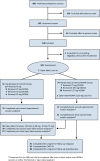Long-term follow-up outcomes of MDMA-assisted psychotherapy for treatment of PTSD: a longitudinal pooled analysis of six phase 2 trials
- PMID: 32500209
- PMCID: PMC7351848
- DOI: 10.1007/s00213-020-05548-2
Long-term follow-up outcomes of MDMA-assisted psychotherapy for treatment of PTSD: a longitudinal pooled analysis of six phase 2 trials
Retraction in
-
Retraction Note: Long-term follow-up outcomes of MDMA-assisted psychotherapy for treatment of PTSD: a longitudinal pooled analysis of six phase 2 trials.Psychopharmacology (Berl). 2024 Nov;241(11):2407. doi: 10.1007/s00213-024-06665-y. Psychopharmacology (Berl). 2024. PMID: 39126500 Free PMC article. No abstract available.
Abstract
Rationale: Posttraumatic stress disorder (PTSD) is a chronic condition that has wide-ranging negative effects on an individual's health and interpersonal relationships. Treatments with long-term benefits are needed to promote the safety and well-being of those suffering from PTSD.
Objectives: To examine long-term change in PTSD symptoms and additional benefits/harms after 3,4-methylenedioxymethamphetamine (MDMA)-assisted psychotherapy for treatment of PTSD.
Methods: Participants received two to three active doses of MDMA (75-125 mg) during blinded or open-label psychotherapy sessions with additional non-drug therapy sessions. PTSD symptoms were assessed using the Clinician-Administered PTSD Scale for DSM IV (CAPS-IV) at baseline, 1 to 2 months after the last active MDMA session (treatment exit), and at least 12 months post final MDMA session (LTFU). A mixed-effect repeated-measures (MMRM) analysis assessed changes in CAPS-IV total severity scores. The number of participants who met PTSD diagnostic criteria was summarized at each time point. Participants completed a long-term follow-up questionnaire.
Results: There was a significant reduction in CAPS-IV total severity scores from baseline to treatment exit (LS mean (SE) = - 44.8 (2.82), p < .0001), with a Cohen's d effect size of 1.58 (95% CI = 1.24, 1.91). CAPS-IV scores continued to decrease from treatment exit to LTFU (LS mean (SE) = - 5.2 (2.29), p < .05), with a Cohen's d effect size of 0.23 (95% CI = 0.04, 0.43). The number of participants who no longer met PTSD criteria increased from treatment exit (56.0%) to LTFU (67.0%). The majority of participants reported benefits, including improved relationships and well-being, and a minority reported harms from study participation.
Conclusions: PTSD symptoms were reduced 1 to 2 months after MDMA-assisted psychotherapy, and symptom improvement continued at least 12 months post-treatment. Phase 3 trials are investigating this novel treatment approach in a larger sample of participants with chronic PTSD.
Trial registration: clinicaltrials.gov Identifier: NCT00090064, NCT00353938, NCT01958593, NCT01211405, NCT01689740, NCT01793610.
Keywords: Long-term follow-up; MDMA; MDMA-assisted psychotherapy; PTSD.
Conflict of interest statement
Lisa Jerome, Allison Feduccia, and Julie Wang received salary support for full-time employment with MPBC. Scott Hamilton, Mt Tam Data Analysis, received salary support from MPBC as an independent biostatistician. Berra Yazar-Klosinski received salary support for full-time employment with MAPS. Amy Emerson received salary support for full-time employment with MPBC. Michael Mithoefer received salary support from MPBC as a clinical investigator and clinical trial medical monitor as well as for training and supervision of research psychotherapists. Rick Doblin received salary support for full-time employment with MAPS.
References
-
- Baggott MJ, Coyle JR, Siegrist JD, Garrison KJ, Galloway GP, Mendelson JE (2016) Effects of 3,4-methylenedioxymethamphetamine on socioemotional feelings, authenticity, and autobiographical disclosure in healthy volunteers in a controlled setting. J Psychopharmacol 30:378–387 10.1177/0269881115626348 - DOI - PubMed
-
- Barone W, Beck J, Mitsunaga-Whitten M, Perl P (2019) Perceived benefits of MDMA-assisted psychotherapy beyond symptom reduction: qualitative follow-up study of a clinical trial for individuals with treatment-resistant PTSD. J Psychoactive Drugs 51:199–208 10.1080/02791072.2019.1580805 - DOI - PubMed
-
- Batelaan NM, Bosman RC, Muntingh A, Scholten WD, Huijbregts KM, van Balkom A (2017) Risk of relapse after antidepressant discontinuation in anxiety disorders, obsessive-compulsive disorder, and post-traumatic stress disorder: systematic review and meta-analysis of relapse prevention trials. BMJ (Clinical research ed) 358:j3927 10.1136/bmj.j3927 - DOI - PMC - PubMed
Publication types
MeSH terms
Substances
Associated data
LinkOut - more resources
Full Text Sources
Other Literature Sources
Medical
Miscellaneous


